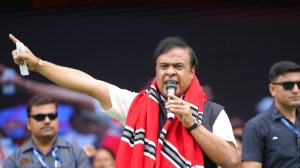India’s emerging as a `great power’, US thinktank advises Bush
WASHINGTON, DECEMBER 7: A Bush White House should acknowledge India's progress towards becoming a major Asian power and engage it on a muc...

WASHINGTON, DECEMBER 7: A Bush White House should acknowledge India’s progress towards becoming a major Asian power and engage it on a much larger canvas than South Asia, a bipartisan panel of influential foreign policy analysts has advised presumptive President-elect George W. Bush.
In a sweeping reassessment of India’s place in U.S foreign policy and national security considerations, the panel said the Indian economy has been growing at about seven per cent since 1991 a growth which is believed to continue. This would make India the world’s fourth largest economy (in purchasing-power-parity terms) by 2015.
“An economy of that size would increase India’s ability to modernise its military forces, develop a credible nuclear deterrent, and deepen US-India linkages. In short, if current trends hold, India will emerge as a great power,” the panel said in its report Taking Charge: A Bipartisan Report to the President Elect on Foreign Policy and National Security.
The panel in its transmittal letter advised Bush to formulate a new South Asia policy that proceeds from “decoupling India and Pakistan in U.S calculations.”
In sharp contrast to its upbeat outlook of India, the Blue Ribbon panel that worked under the aegis of the conservative thinktank Rand Corporation painted a dismal picture of Pakistan, saying that country was in serious crisis and is pursuing policies counter to important U.S interests.
The report is endorsed by some of the most prominent foreign policy thinkers in Washington on both sides of the ideological divide. Among them are former Defence Secretary Frank Carlucci, Rand Corporation’s Lynn Davis, Carnegie Endowments Jessica Mathews, former Lockheed Martin CEO Norman Augustine, and Harvard University’s Ashton Carter. Some of them are tipped to be in a Bush administration.
The panel called on the incoming administration to increase pressure on Pakistan to “show restraint in Kashmir, and to focus on solving its own internal problems.” It urged Bush to “clearly communicate to Pakistan’scivilian and military leadership your strong preference for restraint in Kashmir.”
The report said Pakistan continues to be beset by unhealthy political, economic, and strategic trends that have become both intractable and mutually reinforcing. The most disturbing of these trends has been the growth of Islamic extremism.
The panel said Islamabad appears committed to using its emerging nuclear capabilities for strategic cover as it challenges India through its support for insurgents in Kashmir. Islamabad also sponsors Taliban in Afghanistan. Given the Taliban’s ties with terrorists such as Osama bin Laden, the threat they pose to stability in Central Asia, and the possibility that Taliban-style Islamic extremism might spread even to Pakistan itself, “Pakistani policies have the potential to pose a broader challenge to U.S interests,” the panel said in its report. The disruption of democratic governance resulting from the military coup in 1999 is likely to continue well into the foreseeable future and the military is likely to be formally involved in governance even after General Musharraf leaves office, says the panel.
In contrast, it said India’s democratic institutions remain both durable and robust. However, it cautioned that the “traditionally liberal and secular character of the state is increasingly contested by a variety of new Hindu fundamentalist groups in Indian politics.”
While the panel report glossed over the non-proliferation issue and virtually accepted India’s nuclear status, there was a dissenting note byCarnegie’s Jessica Matthews questioning the sidestepping. She wanted the panel to discuss how the US could best reconcile the reality of India’s placein the world with the U.S global responsibility to curb nuclear proliferation.
How Bush could help India
* Strengthen economic cooperation, including efforts to remove remaining economic sanctions. Remove bureaucratic impediments to civilian high technology transfers
* Enhance military-to-military cooperation in the form of joint exchanges, training, exercises, and eventually “joint operations”
* Encourage Indian integration into multilateral security and economic organisations in the Asia-Pacific region
* Develop common approach with India on terrorism, stability in Asia, proliferation, peace operations etc.
Photos





- 01
- 02
- 03
- 04
- 05


























